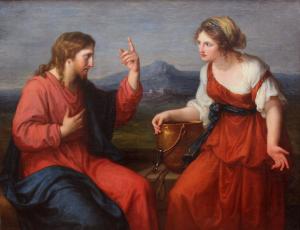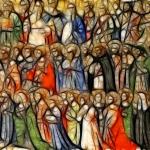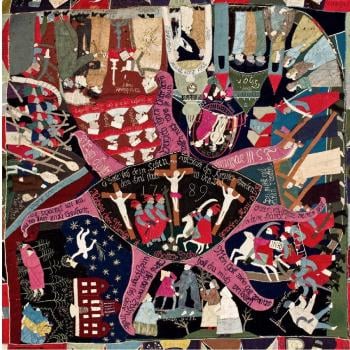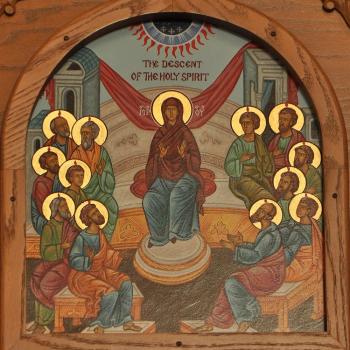
When Jesus went to Sychar, a Samaritan city, he encountered the Samaritan woman, traditionally named St. Photina, near Jacob’s well:
There came a woman of Samaria to draw water. Jesus said to her, “Give me a drink.” For his disciples had gone away into the city to buy food. The Samaritan woman said to him, “How is it that you, a Jew, ask a drink of me, a woman of Samaria?” For Jews have no dealings with Samaritans. Jesus answered her, “If you knew the gift of God, and who it is that is saying to you, `Give me a drink,’ you would have asked him, and he would have given you living water” (Jn. 4:7-10 RSV).
It might be surprising to some that this meeting between Jesus and Photina would be commemorated in the Sundays of Eastertide.[1] What connects it with the message of the resurrection? Two different things reveal themselves to us. First, we find Jesus tells Photina that he offers the living water, a share in the spiritual drink of the Holy Spirit:
Jesus said to her, “Every one who drinks of this water will thirst again, but whoever drinks of the water that I shall give him will never thirst; the water that I shall give him will become in him a spring of water welling up to eternal life” (Jn. 4:13-14 RSV).
This water, this spiritual drink, is given out to all in light of Jesus’ resurrection from the dead. The Holy Spirit, the Spirit of Christ, the Spirit which dwelt upon him at his baptism, is now sent by Jesus to all the faithful. He is the “other comforter” sent by Jesus (cf. Jn. 14:16; Jn. 15:26), who was to come only after Jesus’s death, resurrection and ascension into heaven. Those who come to Jesus, those who join themselves to him, those who share with him in his death and resurrection (cf. Rom. 6:3), come to be a part of his mystical body, and therefore share with him, in him and through him, the Holy Spirit.
But what is also very important is that Jesus reveals that this gift, the gift of the Holy Spirit, is a gift which is meant for all humanity. Though salvation is from the Jews (cf. Jn. 4:22), it is open to all. Photina found herself welcomed by Jesus despite her status both as a Samaritan but also as a woman. She was called by Jesus, similar to the way the apostles themselves were called by Jesus: he shows up, and cryptically revealed not only himself to her, but also revealed his understanding of who she is, that is, of her whole earthly history, before awakening within her a faith in him which led her to proclaim Jesus to those within the Samarian city:
The woman said to him, “Sir, give me this water, that I may not thirst, nor come here to draw.” Jesus said to her, “Go, call your husband, and come here.” The woman answered him, “I have no husband.” Jesus said to her, “You are right in saying, `I have no husband’; for you have had five husbands, and he whom you now have is not your husband; this you said truly.” The woman said to him, “Sir, I perceive that you are a prophet. Our fathers worshiped on this mountain; and you say that in Jerusalem is the place where men ought to worship” (Jn. 4:15-20 RSV).
At first, Photina considered Jesus to be only a prophet. What she said was true, but it was not the full extent of the truth. Jesus certainly is a prophet, for the messiah was to be a prophet like unto Moses (cf. Deut. 18:15). However, she understood that when the messiah came, the division between Jews and Samaritans, between Jews and everyone else, would be overcome.
The messiah would come from the Jews. Photina had no difficulty believing that, even if she and her fellow Samaritans had difficulty believing the fullness of the Jewish tradition. The Samaritans and the Jews held much in common, as they all traced themselves back to Moses, but their interpretations of the Torah and the history after Moses led them to distinct religious traditions and practices. Yet, the messiah was expected, even by the Samaritans, and so salvation was from the Jews. This was not to be seen as some sort of exclusive nationalism, where salvation was from the Jews and only for the Jews. Rather as Jesus told her, those who follow God will worship God in spirit and truth, no longer attached to nationalistic boundaries and the identities surrounding them (cf. Jn. 4:21-24):
The woman said to him, “I know that Messiah is coming (he who is called Christ); when he comes, he will show us all things.” Jesus said to her, “I who speak to you am he.”
Just then his disciples came. They marveled that he was talking with a woman, but none said, “What do you wish?” or, “Why are you talking with her?” (Jn. 4:25-27 RSV).
Photina marveled at what she was told. Her encounter with Jesus had transformed her. Immediately, she stopped what she was doing and went to tell the people of Sychar about him (cf. Jn. 4:29). That is, she became a disciple and witness of Christ, bringing with her many Samaritans to Jesus who came to see him and came to believe in him in part because of her witness, but in part because of their own encounter with Christ.
The story, though it occurred before the resurrection, demonstrates (more than many others), the universal appeal of Christ. Salvation was from the Jews, and so they held a special place in salvation history, but that place should not be used to undermine others. That was one of the problems that some of the Jews had: there were some nationalistic zealots incapable of seeing the greater picture. This was not the fault of Judaism and the Jewish tradition, which clearly understood God was a God over all, and so God cared for all, and would show that through his interaction with Israel. Israel held a special place in salvation history, but that history, that goal embraced the whole of humanity. Like many nationalists today, Jewish extremists were faulted for taking the good of their tradition, their place in providence, and using it to override the value of others. The special place God had for Israel in history, when extrapolated to form such a nationalistic ideology, undermined the message of the Torah itself (which not only said that the people of Israel should respect foreigners, but also in the eschatological work of the messiah, humanity would come together to worship God together).
Jesus’ encounter with the Samaritan woman, brought into the Paschal celebration, reminds us of the universalization of God’s grace through the resurrection. God is not a respecter of persons; just as Samaritans (and Gentiles) were called to the everlasting covenant in Christ, so women as well as men were called by Christ and given a special mission by him. St. Photina was sent to her people, to the Samaritans, to evangelize them, telling them what she had come to know through her encounter with Jesus. It was before his death and resurrection, so she, like the rest of Jesus’ disciples, did not know what Jesus would do as the messiah, but she came to understand and believe in him and bring others to faith in him.
Likewise, there is much symbolism in this passage, which early commentators like Origen and those writing the scholia in St. Maximos the Confessor’s writers found to be significant. The well was Jacob’s well: it was seen to be connected to the whole spiritual stream given to the Patriarchs and through the Jews. Jesus, by asking Photina to give him something to drink from that well, was seen to affirm the goodness of that drink, that is, of the whole Jewish tradition:
But if indeed there were not something useful that resulted from drinking from the fountain, Jesus would not have sat upon the fountain, nor would he have said to the Samaritan woman, “Give me a drink.”[2]
There is good to be found in the spiritual stream associated with Jacob, and with him, the Jews. It is found in the Scriptures, the Torah, the prophets, and the successors on the Seat of Moses; through them, we are refreshed and given the foundation which we need in order to come to Jesus and receive the gift of the Holy Spirit. The scholia associated with the writings of St. Maximos the Confessor put it succinctly:
Jacob’s well is Scripture. The water is the knowledge that Scripture contains. The depth of the well is the meaning of the biblical enigmas, which are all bout beyond one’s reach. The “bucket” used for drawing out the water is learning about the Divine Word acquired through written letters, which the Lord did not require, since he is the Word Himself, and He does not give this knowledge to the faithful through learning and study, but to those who are worthy He grants a measure of the ever-flowing wisdom of spiritual grace. [3]
But we can go further. The well is Jacob’s well, but the one called to give that gift to Jesus was a Samaritan woman. This, then, affirms, not only is there good in Jacob’s well, good to be found in Scripture, there is also good to be had from other sources, from other traditions; that there can be ways to draw from Scripture borrowed from (or learned from) those who come to it from a variety of philosophical and religious traditions, giving a drink worthy of being drunk. Jesus showed not only the well was good, but the Samaritans could properly draw from it and give a drink which he could accept; likewise, those who learned logic or epistemology or other disciplines are granted that they have a way to address Scripture and provide refreshment to others through their wisdom and knowledge. But it is also telling that it was a woman who was shown she can do this: Jesus once again, in his ministry, demonstrated that women should be respected, that they too could handle the Scriptures and draw from it wisdom to help others. Of course, men or women alike can only give so much from Scripture apart from the living water, from the Holy Spirit and the living tradition which the Holy Spirit inspires. Jesus, therefore, affirms the limited good which comes from exploring Scripture as a human enterprise, but then offers something else: something which transcends Scripture and its interpretation, with the gift of the Holy Spirit, given to all through the glory of the resurrection, as Origen implied: “The Scriptures, therefore, are introductions, called the fountain of Jacob. Once they have now been accurately understood, one must go up from them to Jesus, that he may freely give us the fountain of water that leaps into eternal life.”[4]
By remembering St. Photina, and the promise of the Holy Spirit given to her, we remember that in the joy of the resurrection, Christ truly brings humanity together to be a new creation in Jesus, a new creation in which division such as nationality and gender are overcome as all who come to Jesus are given the gift of the Holy Spirit, and with that gift, the joy of eternal life.
The Samaritan Woman came to the well in faith; / She saw You, the Water of Wisdom, and drank abundantly / She inherited the Kingdom on High and is ever glorified! (Kontakion Sunday of the Samaritan Woman).
Let us imitate the Samaritan woman. Let us also draw from Jacob’s well, using our own bucket, our own resources, to initialize our understanding of the faith. Let us then, with full faith in Jesus, be willing to drink from him and accept the full gift of the Holy Spirit. Let us see the world anew in him, the world restored, where heaven is joined with earth, and humanity is truly made one. Let us take in the Holy Spirit and truly find ourselves thriving in the Spirit, nourished with the perpetual stream which can sustain us, not only in our temporal existence, but in eternity itself.
[1] It is the fifth Sunday of Pascha in the Byzantine tradition.
[2] Origen, Commentary on the Gospel of John Books 13-32. Trans. Ronald Heine (Washington, DC: CUA Press, 1993), 73.
[3] St. Maximos the Confessor, On Difficulties in Sacred Scripture: The Responses to Thalassios. Trans. Fr. Maximos Constas (Washington, DC: CUA Press, 2018), 240 [From the scholion].
[4] Origen, Commentary on the Gospel of John Books 13-32, 76.
Stay in touch! Like A Little Bit of Nothing on Facebook.
If you have liked what you read, please consider sharing it with your friends and family!













